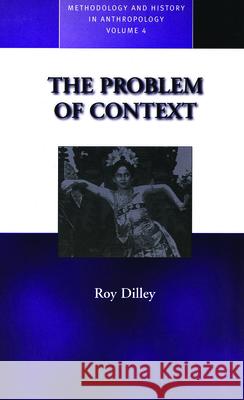The Problem of Context: Perspectives from Social Anthropology and Elsewhere » książka
The Problem of Context: Perspectives from Social Anthropology and Elsewhere
ISBN-13: 9781571817730 / Angielski / Miękka / 1999 / 256 str.
The Problem of Context: Perspectives from Social Anthropology and Elsewhere
ISBN-13: 9781571817730 / Angielski / Miękka / 1999 / 256 str.
(netto: 129,58 VAT: 5%)
Najniższa cena z 30 dni: 135,22
ok. 22 dni roboczych.
Darmowa dostawa!
The apparently simple notion that it is contextualization and invocation of context that give form to our interpretations raises important questions about context definition. Moreover, different disciplines involved in the elucidation and interpretation of meanings construe context indifferent ways. How do these ways differ? And what analytical strategies are adopted in order to suggest that the relevant context is "self-evident"? The notion of context has received less attention than is due such a central, key concept in social anthropology, as well as in other related disciplines. This collection of contributions from a group of leading social anthropologists and anthropological linguists addresses the question of how the idea of context is constructed, invoked, and deployed in the interpretations put forward by social anthropologists. The ethnographic focus embraces peoples from regions such as Bali, Europe, Malawi, and Zaire. Primarily theoretical in its aims, the work also draws on expertise from anthropological linguistics and philosophy in order to set the issue as much in a comparative disciplinary perspective as in a comparative cross-cultural one.
The apparently simple notion that it is contextualization and invocation of context that give form to our interpretations raises important questions about context definition. Moreover, different disciplines involved in the elucidation and interpretation of meanings construe context indifferent ways. How do these ways differ? And what analytical strategies are adopted in order to suggest that the relevant context is "self-evident"? The notion of context has received less attention than is due such a central, key concept in social anthropology, as well as in other related disciplines.This collection of contributions from a group of leading social anthropologists and anthropological linguists addresses the question of how the idea of context is constructed, invoked, and deployed in the interpretations put forward by social anthropologists. The ethnographic focus embraces peoples from regions such as Bali, Europe, Malawi, and Zaire. Primarily theoretical in its aims, the work also draws on expertise from anthropological linguistics and philosophy in order to set the issue as much in a comparative disciplinary perspective as in a comparative cross-cultural one.











